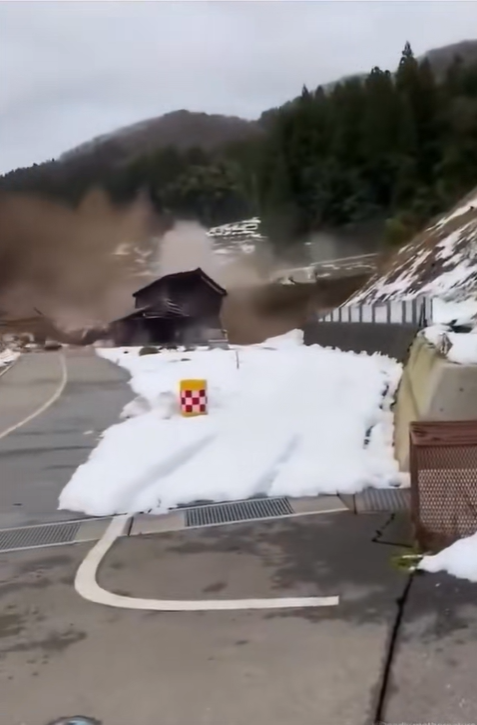The morning of January 1st began with a rare calm over the Noto Peninsula of Ishikawa Prefecture. Fishermen prepared their boats in quiet harbors, children laughed under a pale winter sun, and the scent of pine smoke rose lazily from homes tucked into the hillsides. No one knew that beneath the stillness, the Earth’s crust was tightening its fists.
At 16:10 JST, the world changed.
A deep, guttural roar erupted from the ground — a sound older than language. In an instant, the landscape convulsed as a magnitude 7.6 earthquake tore through Ishikawa. Houses shuddered and split, ancient shrines swayed, and the ocean itself seemed to stagger backward before lunging forward again.
From the slopes of Mount Hodatsu, the quake unleashed something even more terrifying. The shaking dislodged entire sections of hillside, sending a massive landslide crashing into the valley below. Centuries-old cedar trees rode the wall of mud like toothpicks, smashing through villages with unstoppable force. The air filled with the thunder of earth meeting earth — a low, grinding howl that swallowed everything else.
In the town of Suzu, 67-year-old Masako Takahashi clung to the doorframe of her wooden home as the tatami floor split apart. Her late husband’s photo tumbled from the altar; she grabbed it instinctively, pressing it to her chest as the house tilted and began to slide. The world outside was nothing but dust and noise.
Down in Wajima, where the famed morning market once buzzed with life, the streets fractured like broken pottery. Power lines fell, sparks lighting the swirling haze. Amid the chaos, volunteers from the local fire brigade — some still in slippers from their New Year’s meals — raced to pull survivors from the debris, shouting names over the rumble of aftershocks.
As night fell, silence replaced the roar. Snow began to drift down over a land newly rearranged — valleys filled, rivers diverted, roads erased. From the air, rescue helicopters could barely recognize the terrain. The coastline had shifted; entire neighborhoods were gone.
And yet, amid the devastation, people gathered in school gyms and temples, huddling together under blankets. A child’s voice cut through the quiet:
“Will the mountain move again?”
Masako, wrapped in her coat, whispered softly, “No. The mountain’s resting now. But we will move forward.”
By morning, Ishikawa had become a landscape of loss and resilience — scarred, yes, but not defeated. Volunteers from across Japan poured in, bringing supplies, warm meals, and hope. The mountain had moved, the earth had spoken — and the people of Ishikawa answered with courage.
